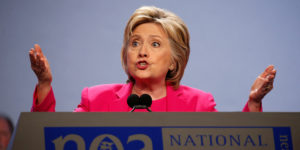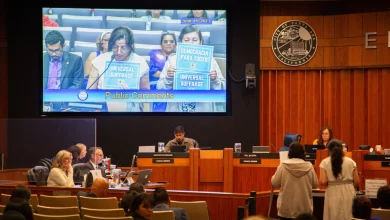 The Save Our Schools Coalition for Action rally and conference July 8 and 9 in Washington D.C., which brought together nearly 500 community activists and educators from around the country, showed that progressive educators are skeptical about Hillary Clinton’s position on education. Why would this be? We might expect to find some sort of explanation in her actual record on education.
The Save Our Schools Coalition for Action rally and conference July 8 and 9 in Washington D.C., which brought together nearly 500 community activists and educators from around the country, showed that progressive educators are skeptical about Hillary Clinton’s position on education. Why would this be? We might expect to find some sort of explanation in her actual record on education.
Predictably enough, Clinton’s support for corporate education reform goes back to the 1980s when she backed the use of high stakes (i.e. punitive) testing, justifying it as a way to “improve standards.” Since at least the 1980s, such rhetoric has been code for the corporate agenda of privatizing public education, punishing teachers, and demonizing the most oppressed students for social conditions they have no control over .
When Bill Clinton was running for President in 1992, Hillary received a letter from Marc Tucker, the president of the conservative, corporate-sponsored National Center on Education and the Economy. In the letter, Tucker outlined a plan “to remold the entire American system for human resources development” in a way that more completely transferred school control and influence from school boards and teacher unions to “clients” (i.e. employers/capitalists). President Bill Clinton did his part in increasing corporate control over what they call human resource development systems (i.e. education) by inciting the augmentation of charter schools.
Through the 1990s, Hillary Clinton was a firm supporter of charter schools and any policy that would, “streamline the due-process standards so that teachers that don’t measure up would no longer be in the classroom” which she said in 2000 during her Senate campaign. We see here again the use of accountability rhetoric to support the erosion of teachers’ protection from arbitrary dismissal, or, in the case of for-profit charters, dismissals motivated by a desire to cut labor costs.
However, about one month after receiving the endorsement for President from the National Education Association in October of 2015 (without consulting their rank and file), Clinton was heard echoing one of the more common critiques of charter schools at a rally in South Carolina. That is, Clinton argued that charter schools do not take the “hardest to teach” students, leaving public schools not only overburdened with work, but with insufficient resources. Was this really a paradigm shifting moment for Clinton or was she just pandering, playing politics at the expense of teachers and students?
Perhaps she was attempting to test the educational waters in her July 5 keynote address at this year’s NEA conference in which Hillary Clinton argued that success should be replicated regardless of whether it comes from public schools or charter schools. This was met by boos from thousands of offended teachers.
Since receiving such negative feedback from teachers, the education plank of the Democratic Party’s 2016 platform has been improved in terms of public education.
For example, the Democrats are now promising free community college for all and reforms that make it easier to repay student loans. However, while they claim they are prepared to crack down on for-profit education corporations pillaging public coffers, they continue to hold on to the dangerous language of accountability. While refusing to take a stand against charter schools in general, the platform calls for supporting more public charter schools but not more for-profit charters. The Democrats are therefore not promising to stop all funding of for-profit charters. Regardless, the modification on charters reflects a shift in policy.
However, as we know, these and other education policy shifts in no way indicate that a Clinton presidency, in practice, would deviate from her record of supporting the very corporate reforms in education that community activists and educators are fighting back against across the country—and Donald Trump is no better.
With no background in politics, Trumps’ only record concerning education is the scandal surrounding Trump University, which has exposed him to be no friend of students. While Trump has made statements about reducing student debt, he has also made statements in favor of charter schools and increasing competition between educational providers in an “education market.”
Ultimately, when we look at the records of Trump and Clinton, when it comes to education (as well as many other crucial issues), Hillary Clinton can hardly be described as a lesser evil.






